Related Research Articles

Walter Whitman Jr. was an American poet, essayist and journalist. A humanist, he was a part of the transition between transcendentalism and realism, incorporating both views in his works. Whitman is among the most influential poets in the American canon, often called the father of free verse. His work was controversial in his time, particularly his 1855 poetry collection Leaves of Grass, which was described as obscene for its overt sensuality.

Leaves of Grass is a poetry collection by American poet Walt Whitman. Though it was first published in 1855, Whitman spent most of his professional life writing and rewriting Leaves of Grass, revising it multiple times until his death. There have been held to be either six or nine individual editions of Leaves of Grass, the count varying depending on how they are distinguished. This resulted in vastly different editions over four decades—the first edition being a small book of twelve poems, and the last, a compilation of over 400.

"Song of Myself" is a poem by Walt Whitman (1819–1892) that is included in his work Leaves of Grass. It has been credited as "representing the core of Whitman's poetic vision."
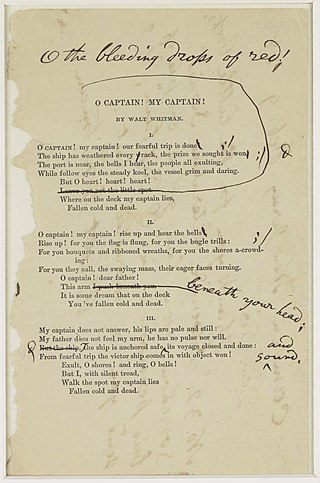
"O Captain! My Captain!" is an extended metaphor poem written by Walt Whitman in 1865 about the death of U.S. president Abraham Lincoln. Well received upon publication, the poem was Whitman's first to be anthologized and the most popular during his lifetime. Together with "When Lilacs Last in the Dooryard Bloom'd", "Hush'd Be the Camps To-day", and "This Dust was Once the Man", it is one of four poems written by Whitman about the death of Lincoln.

"When Lilacs Last in the Dooryard Bloom'd" is a long poem written by American poet Walt Whitman (1819–1892) as an elegy to President Abraham Lincoln. It was written in the summer of 1865 during a period of profound national mourning in the aftermath of the president's assassination on 14 April of that year.

A national poet or national bard is a poet held by tradition and popular acclaim to represent the identity, beliefs and principles of a particular national culture. The national poet as culture hero is a long-standing symbol, to be distinguished from successive holders of a bureaucratically-appointed poet-laureate office. The idea and honoring of national poets emerged primarily during Romanticism, as a figure that helped consolidation of the nation states, as it provided validation of their ethno-linguistic groups.
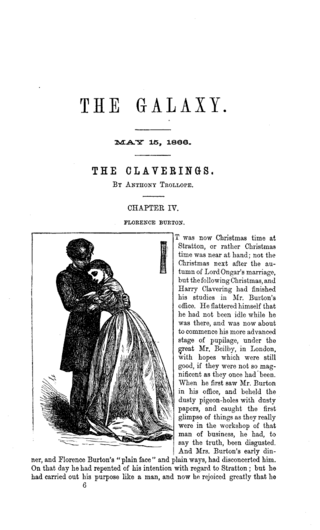
Galaxy Magazine, or The Galaxy, was an American monthly magazine founded by William Conant Church and his brother Francis P. Church in 1866. In 1868, Sheldon and Company gained financial control of the magazine and it was eventually absorbed by The Atlantic Monthly in 1878. Notable contributors to the magazine include Mark Twain, Walt Whitman, Ion Hanford Perdicaris and Henry James.
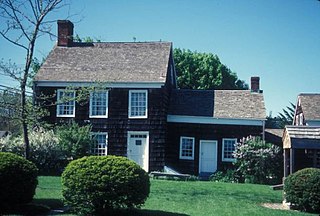
The Walt Whitman Birthplace State Historic Site is a state historic site in West Hills, New York, listed on the National Register of Historic Places. The site preserves the birthplace of American poet Walt Whitman.
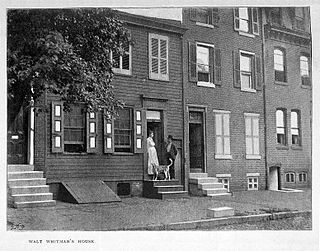
The Walt Whitman House is a historic building in Camden, New Jersey, United States, which was the last residence of American poet Walt Whitman, in his declining years before his death. It is located at 330 Dr. Martin Luther King Jr. Boulevard, known as Mickle St. during Whitman's time there.
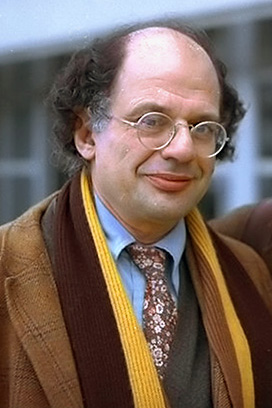
"A Supermarket in California" is a poem by American poet Allen Ginsberg first published in Howl and Other Poems in 1956. In the poem, the narrator visits a supermarket in California and imagines finding Federico García Lorca and Walt Whitman shopping. Whitman, who is also discussed in "Howl", is a character common in Ginsberg's poems, and is often referred to as Ginsberg's poetic model. "A Supermarket in California", written in Berkeley about a market at University Avenue and Grove Street in that city and published in 1956, was intended to be a tribute to Whitman in the centennial year of the first edition of Leaves of Grass.

The Walt Whitman Bridge is a single-level suspension bridge spanning the Delaware River from Philadelphia in the west to Gloucester City in Camden County, New Jersey in the east. The bridge is named after the poet Walt Whitman, who resided in nearby Camden toward the end of his life.

"This Dust Was Once the Man" is a brief elegy written by Walt Whitman in 1871. It was dedicated to Abraham Lincoln, the 16th president of the United States, whom Whitman greatly admired. The poem was written six years after Lincoln's assassination. Whitman had written three previous poems about Lincoln, all in 1865: "O Captain! My Captain!", "When Lilacs Last in the Dooryard Bloom'd", and "Hush'd Be the Camps To-Day".

Donald Kummings was an American professor, poet and scholar of literature, best remembered for his research on poet Walt Whitman. For 36 years he served as a professor of English at University of Wisconsin–Parkside.

Walt Whitman Park is a park in the Downtown Brooklyn section of Brooklyn, New York City, commemorating Walt Whitman. It is adjacent to Cadman Plaza East to the west and Adams Street to the east.

The American poet Walt Whitman greatly admired Abraham Lincoln, the 16th president of the United States, and was deeply affected by his assassination, writing several poems as elegies and giving a series of lectures on Lincoln. The two never met. Shortly after Lincoln was killed in April 1865, Whitman hastily wrote the first of his Lincoln poems, "Hush'd Be the Camps To-Day". In the following months, he wrote two more: "O Captain! My Captain!" and "When Lilacs Last in the Dooryard Bloom'd". Both appeared in his collection Sequel to Drum-Taps later that year. The poems—particularly "My Captain!"—were well received and popular upon publication and, in the following years, Whitman styled himself as an interpreter of Lincoln. In 1871, his fourth poem on Lincoln, "This Dust Was Once the Man", was published, and the four were grouped together as the "President Lincoln's Burial Hymn" cluster in Passage to India. In 1881, the poems were republished in the "Memories of President Lincoln" cluster of Leaves of Grass.
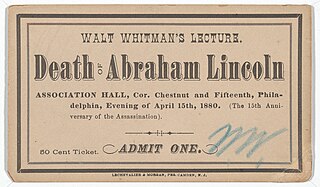
Walt Whitman gave a series of lectures on Abraham Lincoln from 1879 to 1890. They centered around the assassination of Abraham Lincoln, but also covered years leading up to and during the American Civil War and sometimes included readings of poems such as "O Captain! My Captain!". The lectures began as a benefit for Whitman and were generally popular and well received.

Peter George Doyle was an Irish-born American transit worker, known for being an intimate companion of Walt Whitman from around 1865 to 1876, and to some extent to Whitman's death in 1892. Doyle also witnessed the assassination of Abraham Lincoln in 1865.
Passage to India is a poetry collection published by Walt Whitman in 1871. The first edition was 120 pages long and held seventy-four poems, including twenty-three or twenty-four first published in the collection. Whitman likely intended the work as a supplementary volume to his collection Leaves of Grass and included it as part of some copies of that year's edition of Leaves of Grass. The following year all of the supplement was included as part of Leaves of Grass, but it was a separate volume for the 1876 edition and the supplement Two Rivulets was instead included as part of Leaves of Grass. In the 1881 Leaves of Grass both the poems contained in Passage to India and Two Rivulets were distributed throughout Leaves of Grass.
Gay Wilson Allen was an American academic and writer. After holding assistant and associate professorships between the late 1920s to mid 1930s, Allen was hired by Bowling Green University in 1935 as an associate professor. Upon leaving for New York University in 1946, Allen was an English professor until 1969. Apart from working as a visiting scholar until the late 1970s, Allen was on a literary trip with William Faulkner that was sponsored by the United States Department of State during 1955.
References
- ↑ LeMaster, J. R.; Kummings, Donald D. (2013-09-05). The Routledge Encyclopedia of Walt Whitman. Routledge. p. 482. ISBN 978-1-136-70070-5.
